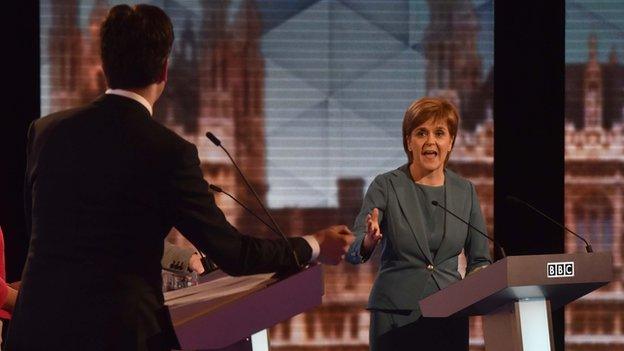Reality Check: Is Osborne right on Labour and SNP?
- Published

The Chancellor George Osborne tweeted , externalthis morning that a Labour and SNP government would mean higher borrowing. Is this true?
This claim contains two elements: one political, the other economic.
Let's look at the politics first. No-one knows what the result of May's general election will be, let alone the result of any subsequent negotiations.
Even the best psephologists in the business say it's too close to call - 40 out of 49 campaign polls so far give a lead of between zero and 2%, well within the margin of error.
No coalition
Labour leader Ed Miliband has ruled out a Labour-SNP coalition in the event of a hung Parliament after May's general election.
"There will be no SNP ministers in any government I lead," he said.
He has not, however, ruled out a more informal arrangement whereby a smaller party supports Labour on key finance votes (supply) and votes other parties might propose to try and bring the government down (confidence).
SNP leader Nicola Sturgeon has said her party's preference is not to have a formal coalition, but that the SNP would be willing to work with Labour at Westminster on an issue-by-issue basis, in return for certain policy commitments.
Looking at other possible scenarios in the event of a hung Parliament, it's worth noting that the prime minister recently declined to rule out any post-general election deal with UKIP.
Higher borrowing?
Analysis published , externalby the independent economic think tank the Institute for Fiscal Studies (IFS) confirms that based on the parties' stated aspirations both the SNP and Labour would borrow more than the Conservatives in the next Parliament.
According to the IFS, the Conservatives are planning a reduction in borrowing of 5.2% of national income between 2014-15 and 2018-19, with a surplus of 0.2% of national income in the final year.
Labour's plans, the organisation says, imply a "smaller reduction" in borrowing of 3.6% of national income between 2014-15 and 2018-19, meaning they will still be borrowing 1.4% of national income by 2018-19.
The SNP's plans also imply a borrowing reduction of 3.6%, the IFS says. But this drop would not be achieved until a year later in 2019-20.
However, all parties are guilty of leaving questions unanswered on borrowing. As the IFS says: "None has managed to be completely specific about how much they want to reduce borrowing, or exactly how they would do it."
It's worth noting that the IFS has had to make a series of assumptions in order to provide a forward-looking analysis. Not all the parties agree with all of these assumptions or the IFS's conclusions.
And even if they did, it is very difficult for anyone (including the IFS) to provide a totally accurate review of what would happen to public finances under future governments.

Election 2015 - Reality Check

What's the truth behind the politicians' claims on the campaign trail? Our experts investigate the facts, and wider stories, behind the soundbites.
Read latest updates or follow us on Twitter @BBCRealityCheck, external
